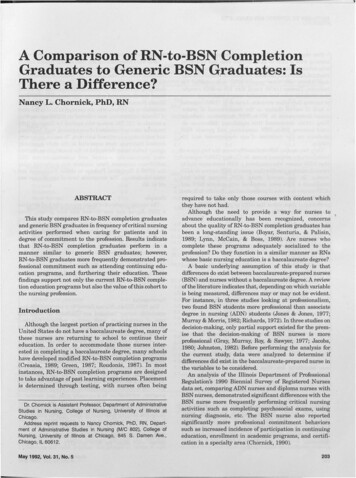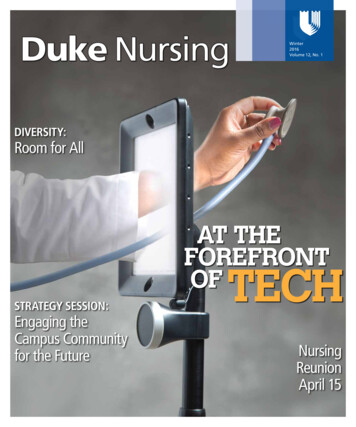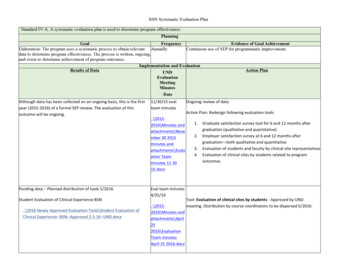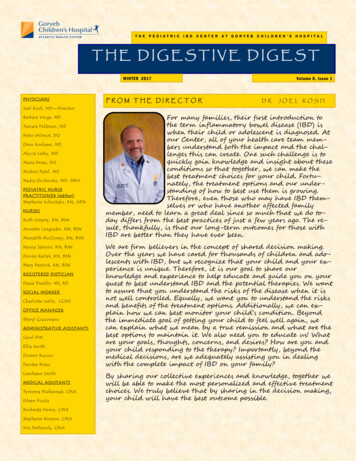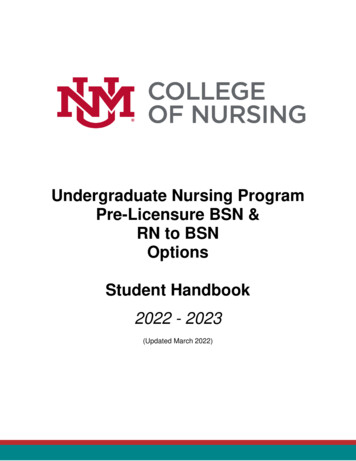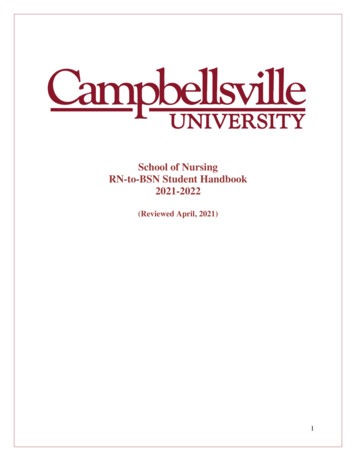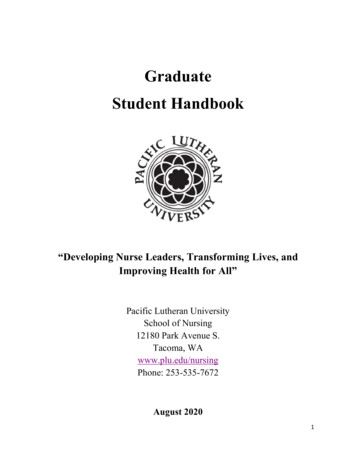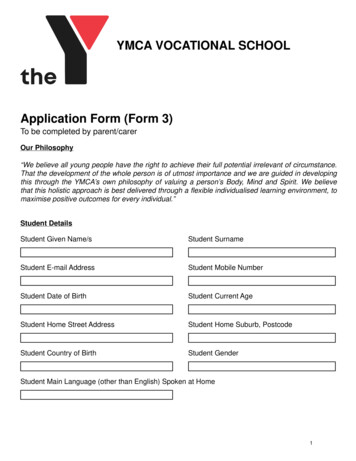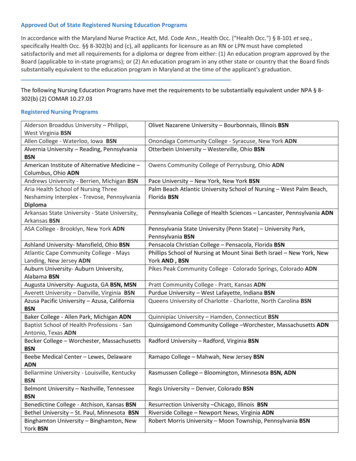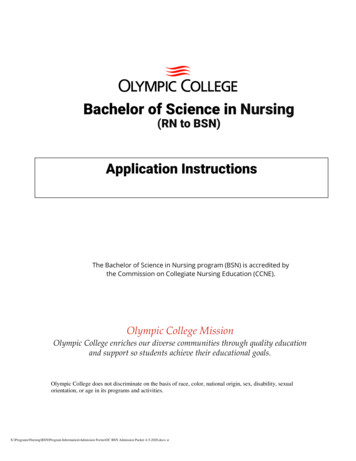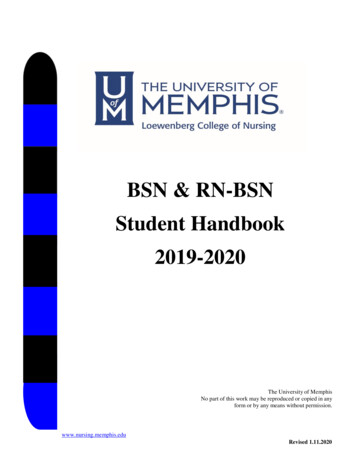
Transcription
BSN & RN-BSNStudent Handbook2019-2020The University of MemphisNo part of this work may be reproduced or copied in anyform or by any means without permission.www.nursing.memphis.eduRevised 1.11.2020
TABLE OF CONTENTSACCREDITATION. 6MEMBERSHIP . 6AFFIRMATIVE ACTION STATEMENT . 6MESSAGE FROM THE DEAN . 7PHILOSOPHY OF NURSING . 8MISSION AND SHARED VISION. 9GENERAL SERVICES .10University ID Card .11Parking Permit .11Email .11Management of Personal Account Information.11Tiger-Lan Laboratory .11Educational Support Program .11Psychological Counseling .11Health Center .11Disability Services .11Student Employment .11Army, Navy, and Air Force ROTC .11Library .12Cultural Opportunities .12Letter of Recommendation .12Requesting Test Scores .13Emergency Notification Procedure .13Disaster Planning .13Inclement Weather .13NURSING STUDENT ACTIVITIES .14Student Nurses Association .15Participation in TSNA and National Student Association .15Sigma Theta Tau International, Beta Theta At-Large Chapter .15Composites .16University of Memphis Honors Assembly .16Scholarship Luncheon .16Academic Success Program .16Loewenberg College of Nursing Alumni Association .16NURSING FEES .17Clinical Course Fee .18Course Management Fee .18Malpractice Insurance .18Skills Laboratory Fee .18Tennessee Professional Assistance Program (TNPAP) .18Testing Fee .18Online Course Fee .18LOEWENBERG COLLEGE OF NURSINGBSN & RN-BSN Handbook, Academic Year 2019-20202
THE BACHELOR OF SCIENCE IN NURSING .19BSN Program Outcomes .20Essential Curricular Concepts, Core Nursing Competencies, BSN Nursing Course Outcomes .20Professional Standards of Nursing Practice and Education .20General Education Curriculum .22General Education Policy for Second Baccalaureate Degree Students .22External Requirements for the Baccalaureate Degree .22General Education Requirements .23Traditional BSN Curriculum Model/5-Semester Curriculum Plan .24Online RN-BSN/3-Semester Curriculum Plan .25Matrix of Outcomes for the BSN Program by Level .26BSN Essentials: Curriculum Content Mapping by Course Number.28Nursing Program Model .29Clinical Course Competencies: Core .30ACADEMIC SUCCESS .35Academic Advisement .36LCON Honors Program Guidelines .36Classroom and Didactic Course Expectations .37Presence in the Classrooms .37Attendance .37Class and Clinical Specific Policies and Procedures .37Recording of Class or Lecture .37Student Conduct .37LCON Intercampus Transfer Guidelines.38Summer School .38Children on Campus .38Communication .39ACADEMIC POLICIES .40Grading Policy .41Testing Policy.41Clinical Evaluation Policy .42Skills/Health Lab Evaluation Policy .43Incomplete Grade .43Nursing Achievement Tests .43National Counsel Licensing Examination (NCLEX) .43Academic Integrity .43Academic Misconduct .43General Education Coursework.44Progression in the Nursing Major .45Irregular Progression in the Nursing Major .45Disqualification from the Nursing Major .45Notification of Dismissal .45Dismissal Appeal Process .45Withdrawal from Nursing Courses .46LOEWENBERG COLLEGE OF NURSINGBSN & RN-BSN Handbook, Academic Year 2019-20203
Late/Retroactive Withdrawal .46Undergraduate Grade Appeal .46Grade Appeal Procedures .47Appeal of a Nursing Grade Form .49CLINICAL REQUIREMENTS & POLICIES .50BSN Clinical Nursing Course Requirements .51Clinical Placement .52Tennessee Clinical Placement System .52Clinical/Lab Attendance Policy.52Clinical Tardy.52Unsatisfactory Clinical Course Grade Prevents Clinical Course Withdrawal .53Transportation .53Repeating Clinical Practicum .53Required Drug Testing .53Clinical Safety .53Health Insurance .54Clinical Practice in Employment Setting .54Nursing Student Employment .54Client Care and Ethics .54Client Safety and Confidentiality .54Clinical Professional Dress .54Clinical Uniform .55Clinical Supplies Required .56DOSAGE CALCULATION POLICY .57Dosage Calculation Procedure .58Rules for Rounding Medication and Intravenous Fluid Amounts .59Verbal and Phone Orders .60ONLINE RN-BSN .61Prior Learning Assessment Guidelines .62Credit by Examination (CBE) .62RN-BSN Credit by Examination/Validation .62ADN Achievement Test .62Prior Learning Portfolio .64Professional Conduct and Comportment .64LOEWENBERG COLLEGE OF NURSING CODE OF ETHICS . 66Code of Ethics . 67Principles of Conduct . 68Students’ Rights and Responsibilities . 69CONSTITUTION OF THE SNA-LCON . 71SUBSTANCE ABUSE POLICY . 80Substance Abuse Policy Statement* . 81Substance Abuse Policy and Drug Testing Procedure Agreement . 88Faculty Procedure for Notification/Suspicion of Drug/Alcohol Use by Students . 89LOEWENBERG COLLEGE OF NURSINGBSN & RN-BSN Handbook, Academic Year 2019-20204
Faculty Report of Reasonable Suspicion of Drug/Alcohol Use Form . 90Student Wellness Contract . 91STUDENT ACKNOWLEDGEMENT OF POLICIES/HANDBOOK . 92Student Acknowledgement of Policies/Handbook Agreement . 93LOEWENBERG COLLEGE OF NURSINGBSN & RN-BSN Handbook, Academic Year 2019-20205
ACCREDITATIONThe baccalaureate and master’s degree programs in nursing at the University of Memphis, LoewenbergCollege of Nursing is accredited by the Commission on Collegiate Nursing Education, 655 K Street, NW,Suite 750, Washington, DC 20001. (202) 887-6791.MEMBERSHIPThe Loewenberg College of Nursing holds agency membership in the American Association of Collegesof Nursing, the Southern Council for Collegiate Education in Nursing, and the National League forNursing.AFFIRMATIVE ACTION STATEMENTThe University of Memphis offers equal educational opportunity to all persons without regard to race,religion, sex, creed, color, national origin or disability. The University does not discriminate on thesebases in recruitment and admission of students or in the operation of any of its programs and activities, asspecified by federal laws and regulations. The designated coordinators for University compliance withSection 504 of the Rehabilitation Act of 1973 and the Americans with Disabilities Act of 1990 are theVice President for Student Affairs and the Equal Employment Compliance Officer. Information in thisdocument will be provided in alternate format upon request.The University of Memphis is an Equal Opportunity/Affirmative Action University. It is committed toeducation of a non-racially identifiable student body.LOEWENBERG COLLEGE OF NURSINGBSN & RN-BSN Handbook, Academic Year 2019-20206
MESSAGE FROM THE DEANDear Nursing Students:Welcome to the Loewenberg College of Nursing (LCON) at the Universityof Memphis! Founded in 1912, the University of Memphis is a place thatcultivates you to be driven by doing.For over 50 years, the LCON has had an unbroken record of academicexcellence in higher education. We prepare nurse clinicians, nursescholars/scientists, nurse educators, and nurse leaders. Our academic excellence is achieved throughan intellectually energetic environment that challenges, yet supports bright, curious students, and isbuilt on the core values of caring, diversity, integrity, and leadership.Our distinguished faculty, dedicated staff, engaged clinical partners, and alumni are committed toyour success. A myriad of services including scholarships are available in the University and theLCON to support your learning, promote your wellbeing, and enrich your college life. To besuccessful, I encourage you to focus, engage, and manage. To become a professional nurse startsthinking like a nurse, and acting like a nurse as you immerse yourself with diverse didactic andclinical learning experiences on campus and across healthcare settings.The future of nursing rests with you who will enter the noble and the most trusted profession Nursing. We are dedicated to the advancement of all engaged in the endeavor of educating you tobecome professional nurses and leaders, and we foresee significant personal and professional growthas outcomes for you. Together, we work with you to make your educational experience challenging,meaningful, and rewarding!As your Dean, I am here to serve you. I look forward to meeting you in person. I can be reached viaemail/call/or stop by: lzhan@memphis.edu; 901-678-2020; CHB 2502J, or follow my twitter@uofmnursingdean.Go Memphis Nursing, Go Tigers!Lin Zhan, PhD, RN, FAANDean and ProfessorLOEWENBERG COLLEGE OF NURSINGBSN & RN-BSN Handbook, Academic Year 2019-20207
Loewenberg College of NursingPHILOSOPHY of NURSINGThe faculty of the Loewenberg College of Nursing supports the goals and purposes of The University of Memphis byproviding a professional educational program that is based upon a strong foundation in the liberal arts and sciences.The faculty believe that learning is a lifelong process that involves change as a result of experiences. Faculty areresponsible for planning, implementing and evaluating a curriculum that is responsive to the needs of the learner, theprofession and a diverse society.The nursing curriculum has been developed within the shared beliefs of the faculty regarding Person, Environment, Health,and Nursing. The faculty believe that the interactions of these elements are modified by the eight nursing competencies of:assessment and technical skills, communication, critical thinking, caring, teaching, management, leadership, and knowledgeintegration.The faculty holds the following beliefs concerning the nursing meta-paradigm:PERSONThe person is a diverse and complex being. Any form of change that affects an aspect of the person can also affect otheraspects which can potentially influence well-being. The person constantly strives to adapt to change in an effort to maintainequilibrium or wellness. Through positive resolution, improved problem solving, and coping skills, the person can functionindependently with others. From birth to death, the person is socialized to roles in groups including families, communities,and society.ENVIRONMENTThe environment consists of all elements external to the person. The person and environment continuously interact whichresults in change. The person’s health is influenced by elements in the environment such as language and culture.Professional nurses practice in diverse settings in provider and designer, manager of care roles. Advanced practice nursesprovide direct primary care and administer the tools of critical thinking and communication to identify and understand thefactors within the environment that influence the goals of nursing.The environment influences the practice of professional and advanced practice nursing. Using critical thinking theprofessional nurse is able to identify factors within diverse settings and to facilitate the development of more therapeuticenvironments of care for restoration, rehabilitation and health promotion of clients.HEALTHHealth is a balanced state of well-being, maintained through adaptation to the environment. The health person functions asan integrated being, maximizing personal potential within the environment. The person’s health is threatened when theability to adapt fails. This ability is influenced by physical, physiological, psychosocial, cultural, and spiritual factors.NURSINGNursing is the protection, promotion, and optimization of health and abilities, prevention of illness and injury, facilitation ofhealing, alleviation of suffering through the diagnosis and treatment of human response, and advocacy in the care ofindividuals, families, groups, communities, and populations.American Nurses' Association (2010). Nursing's Social Policy Statement. The Essence of the Profession.Washington, DC: Author.LOEWENBERG COLLEGE OF NURSINGBSN & RN-BSN Handbook, Academic Year 2019-20208
LOEWENBERG COLLEGE OF NURSINGMISSION AND SHARED VISIONMissionTo provide accessible and innovative higher education by preparing leaders who promote health in the globalcommunity through excellent teaching, rigorous research and collaborative practice/service. To fulfill thismission, we are committed to:Creating a learner-centered educational environmentInspiring life-long learning through excellence in teachingShaping practice through innovation and partnershipsCreating and disseminating knowledge through research and engaged scholarshipEmbracing diversity and cultural competenceVisionTo create a center of excellence where education, research/scholarship, practice and partnerships integrate toadvance nursing science and to promote health of the global community.Strategic Goals Innovative and high quality academic programsStudent success: recruitment, retention, degree completion, and employmentDiversity and InclusionAdvance Nursing SciencePartnerships from local to global communitiesCore Values: Caring. Diversity. Integrity. LeadershipCaring is a human state, a moral imperative or ideal, an affect, an interpersonal relationship, and a nursingintervention.Diversity is embracing the recognition, acceptance, and respect of human differences.Integrity is acting in accordance with an appropriate professional code of ethics and acceptedstandards of practice.Leadership is influencing the actions of individuals and organizations in order to achieve desired goals.Preparing Leaders, Promoting HealthApproved by LCON Faculty December 2010 & 2018LOEWENBERG COLLEGE OF NURSINGBSN & RN-BSN Handbook, Academic Year 2019-20209
GENERAL SERVICESLOEWENBERG COLLEGE OF NURSINGBSN & RN-BSN Handbook, Academic Year 2019-202010
University ID CardThe University issues each student an identification card that bears the student’s name and image referred to as thecampus card. Identification cards can be obtained in 115 Wilder Tower for the Memphis campus and 109 VarnellJones for the Lambuth campus.Parking PermitParking permits can be obtained from the Parking Office located at 120 Zach Curlin Parking Garage.EmailNew students receive an account activation code with their U of M acceptance letter which can be used to createand manage all accounts using the ID Management system.Management of Personal Account InformationStudent may manage their University of Memphis account information through the University’s iAM Account IdentityManagement system by going to Current Students on the U of M main menu. Directions and information is availablethrough the myMemphis portal.Tiger-Lan LaboratoryThere are numerous TigerLAN Computer Labs located across campus. Click here for a list of the labs and thecomputers.Educational Support ProgramAcademic assistance with coursework is available through the Education Support Program, which is housed inMitchell Hall, Room 217, (901) 678-2704. The Educational Sup
The baccalaureate and master's degree programs in nursing at the University of Memphis, Loewenberg College of Nursing is accredited by the Commission on Collegiate Nursing Education, 655 K Street, NW, Suite 750, Washington, DC 20001. (202) 887-6791. MEMBERSHIP
